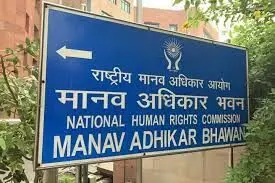
Taking away what was left of the human touch
text_fieldsThe National Human Rights Commission was the haven remaining for the citizens of this country when facing denial of rights and justice from institutions, including the state and judiciary. Despite limitations, the Commission had managed to intervene in several important issues and convince the poor, the weak and the voiceless that justice is not unreachable and that all people have rights. But the Modi government has taken matters to a stage making -, one wonder if even this already limited justice would be denied. For the first time in the history of the National Human Rights Commission, one other than a former Chief Justice of the Supreme Court has been appointed as Chairman. The new Chairman Judge G Arun Kumar retired from the Supreme Court last September. It is not because no eligible former Supreme Court chief justices were available for the post; Mishra has not distinguished himself by doing anything effective to protect the rights of the common man in his term in the judiciary that would make him particularly suited for the top post. He, on the contrary, has a history of helping the top functionaries of the state wielding clout, by using his power and authority.
It was Mishra who overruled the petition by Prasanth Bhushan's body 'Common Cause' accusing Narendra Modi of accepting bribes from Sahara-Birla group while Modi was the Gujarat CM. It was again Mishra who dismissed the petition by former IPS officer Sanjiv Bhatt implicating Modi in the 2002 Gujarat pogrom. Haren Pandya's case is another example. The former Home Minister of Gujarat was murdered in dubious circumstances. The 12 accused were convicted by a Special Court, but after an appeal, the Gujarat High Court overturned the verdict and acquitted everyone. Mishra's bench turned down a Public Interest Litigation filed, fined the petitioners as a deterrent against filing another plea, and ruled in favour of the Gujarat government and the CBI who had opposed the acquittal. Haren's father Vithalbhai Pandya had alleged that the accused were scapegoats to protect higher-ups because Haren had opposed the genocide.
When the case of the mysterious death of the sitting CBI judge Justice Loya (who was hearing the Sohrabuddin Sheikh encounter case) was assigned to Arun Mishra's bench, four senior justices had to call a press conference citing the procedural lapses in doing so. It was justice Mishra who sentenced Prasanth Bhushan with contempt of court for his tweet criticising the then chief justice SA Bobde. It is clear whose rights and powers were protected in all these cases. On top of this is the event where he had sung praises for the prime minister in an international judiciary conference, bringing down the dignity of the position he held.
A member of the panel to select the NHRC chairman, and nominee of the Opposition Congress party, Mallikarjun Kharge had argued that no one from the vulnerable communities like minorities and Dalits who are constantly subjugated to human rights violations had been considered, and he demanded deferment of the committee meeting by a week to resolve this issue. By looking at the petitions that have been submitted to the appointment committee, or the recent trends in the country, one would understand the reasoning behind his argument. But, Narendra Modi, Amit Shah, Rajya Sabha Deputy Chairman Harivansh Narayan Singh and Lok Sabha Speaker Om Birla, together went ahead with the decision to appoint Mishra as the Committee Chairman and former IB Director Rajiv Jain, former J&K High Court Chief Justice Mahesh Kumar Mittal as members, giving no heed to Kharge's suggestion.
Mishra's judgements on eviction cases have always stood with the powerful and privileged. It was eventually nationwide protests that halted plans to evict lakhs of Adivasis who live in the forests. Selecting a former chief of the IB - an institution that works as an arm the state - as a member of the Human Rights Commission is also an improper step. In short, the unfortunate people who seek relief from oppression and denial of justice by the state, would be left to approach again the state in disguise. This course of action is against international law and the essence of democracy. The only solution is for the people to unitedly stay vigilant to protect the rights of their fellow citizens.






















